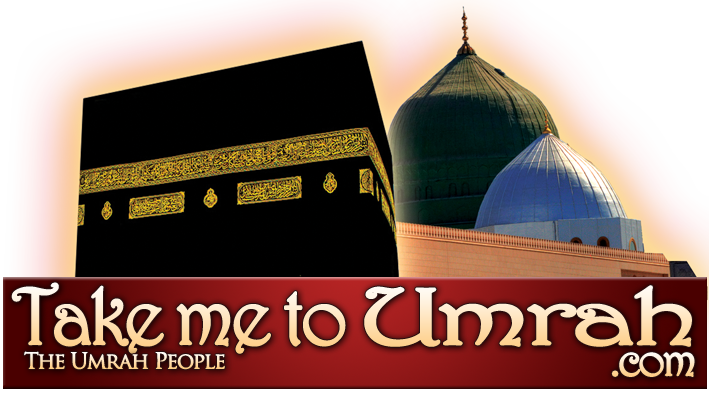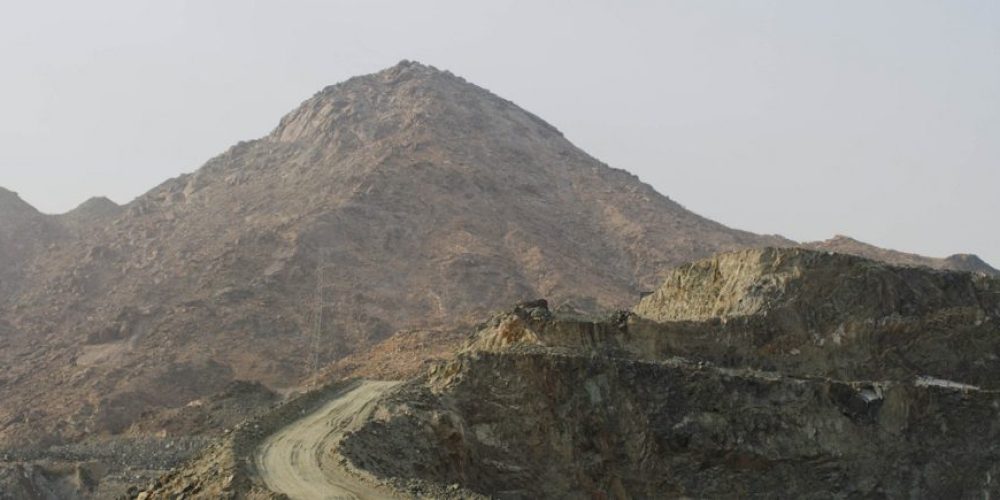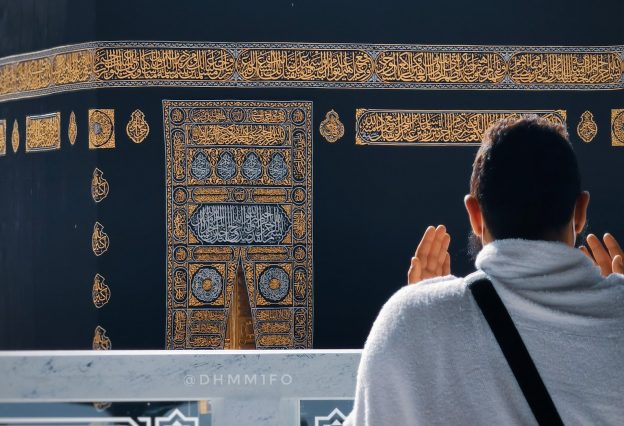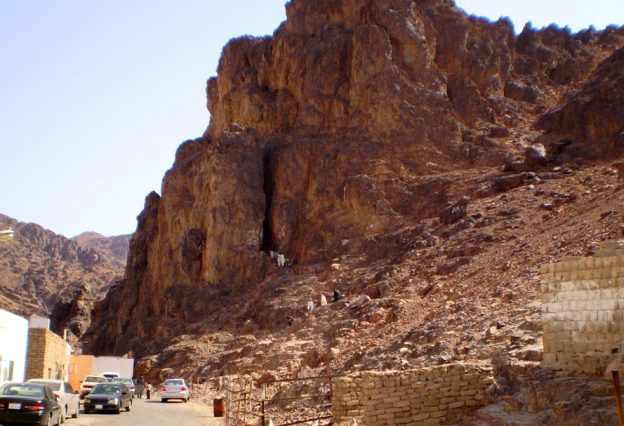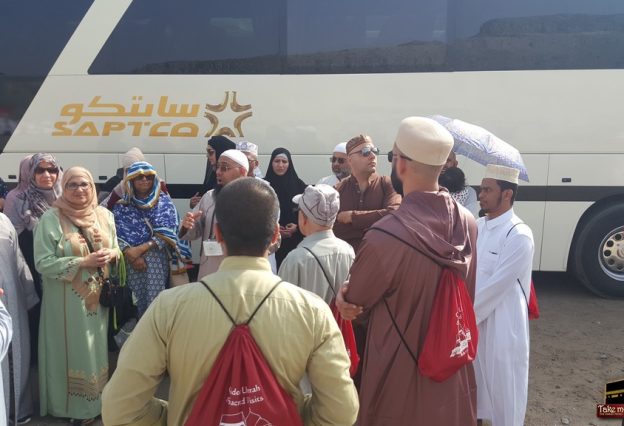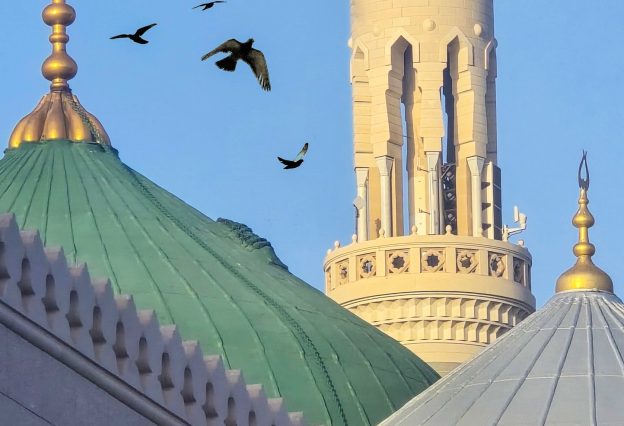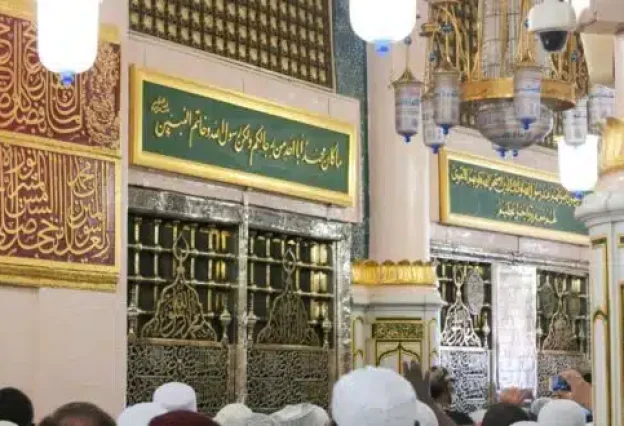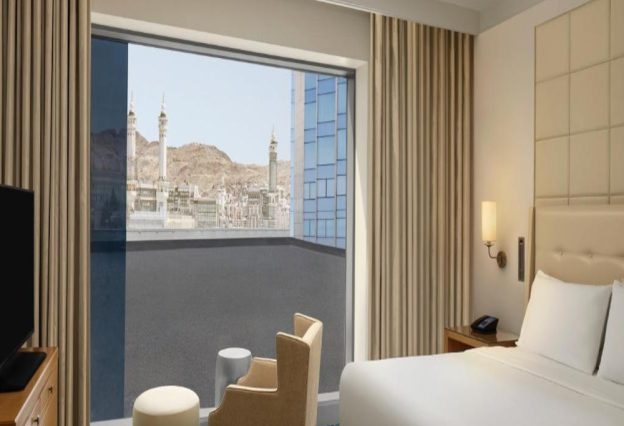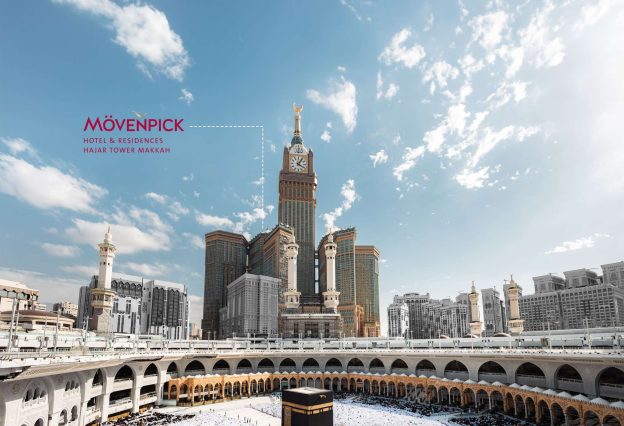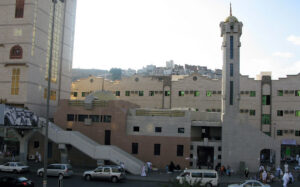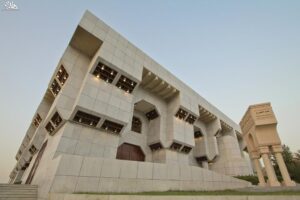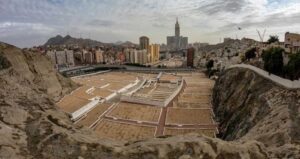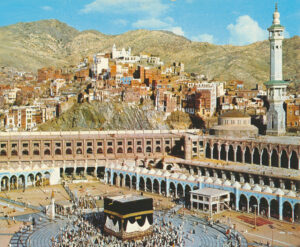Jabal Thawr (Arabic: جبل ثور) is a mountain located four kilometres south of Makkah. It is known for its cave that sheltered the Prophet ﷺ and his close companion Abu Bakr al-Siddiq I from Makkan search parties during their migration to Madinah. The mountain surpasses Jabal al-Nour both in size and distance from Makkah.
Name
The name “Thawr” means “bull”. The mountain consists of three interconnected peaks, with the Cave of Thawr situated on the third peak.
How Long Does It Take to Climb Jabal Thawr?
Situated near the summit of the mountain, reaching the cave involves a challenging climb that typically takes about an hour and a half, including breaks.
History
Background
When Madinah became a sanctuary for Islam and its adherents, the Messenger of Allah ﷺ announced to his Companions that anyone wishing to emigrate to Madinah was welcome to do so. The first to respond was Abu Salamah I, followed by a steady stream of Muslims. Despite the efforts of the disbelievers to hinder emigration upon learning of it, many Muslims managed to make the journey secretly. Those who remained behind were either unable to afford emigration or were imprisoned.
The Messenger of Allah ﷺ himself had not yet emigrated, as he awaited the divine command to do so. He also instructed Abu Bakr and Ali L to stay with him.
Initially, the disbelievers in Makkah were pleased to see the Muslims leaving, assuming it would rid the city of those opposed to their idols. However, their satisfaction turned to apprehension as they observed almost all the Muslims emigrating to Madinah, finding refuge among the Ansar. Concerned that the Prophet Muhammad ﷺ would also relocate to Madinah and mobilize an army against them, the Quraysh convened a large gathering at Dar al-Nadwah (the Assembly House). This assembly included prominent figures such as Abu Sufyan, Abu Jahl, Abu al-Bakhtari and others, and Iblis (Shaytan), who disguised himself as an old man to attend.
During the meeting, various proposals were discussed regarding the Prophet ﷺ. Abu al-Bakhtari suggested imprisoning him, but Iblis rejected the idea, warning of the loyalty of the Prophet’s ﷺ followers. Abu al-Aswad Rabiah proposed expulsion, but Iblis opposed this, recognizing the persuasive power of the Prophet’s ﷺ message.
Subsequently, Abu Jahl proposed a plan to collectively assassinate the Prophet ﷺ, spreading the responsibility across all tribes to avoid retaliation from Banu Hashim. Iblis enthusiastically endorsed this plan, and it was accepted by the attendees.
However, Allah protected His Beloved Messenger ﷺ and thwarted the plot of the disbelievers. This incident is mentioned in the Quran:
وَإِذْ يَمْكُرُ بِكَ ٱلَّذِينَ كَفَرُوا۟ لِيُثْبِتُوكَ أَوْ يَقْتُلُوكَ أَوْ يُخْرِجُوكَ ۚ وَيَمْكُرُونَ وَيَمْكُرُ ٱللَّهُ ۖ وَٱللَّهُ خَيْرُ ٱلْمَـٰكِرِينَ ❁
And (remember, O Muḥammad), when those who disbelieved plotted against you to restrain you or kill you or evict you (from Makkah). But they plan, and Allah plans. And Allah is the best of planners.
[Surah al-Anfal, 8:30]
Preparations to Migrate
When the disbelievers resolved to kill the Messenger of Allah ﷺ and returned home, Allah sent Jibril S to him with a crucial instruction: “O My Beloved! Do not sleep in your bed tonight, but emigrate to Madinah.”
Responding to this divine command, the Messenger of Allah ﷺ went to the house of Abu Bakr al-Siddiq I at noon. He requested a private conversation, ensuring no one else was present due to the sensitive nature of the matter. Abu Bakr assured him that only his daughter Aisha J, who was married to the Prophet ﷺ by the point, was in the house.
The Messenger of Allah ﷺ then informed Abu Bakr of Allah’s permission to emigrate to Madinah. Abu Bakr, expressing his desire to accompany him, was granted this honour.
For four months prior, Abu Bakr had prepared two camels specifically for this journey, feeding them acacia tree leaves. He offered the Messenger of Allah ﷺ a choice between the camels, with the Prophet ﷺ insisting on paying for the one he chose.
Asma bint Abi Bakr J, Abu Bakr’s eldest daughter, prepared provisions for the journey. She packed food into a satchel and secured it with a waist belt, earning her the title “She of the Two Girdles” (Dhat al-Nitaqayn).
Once preparations were complete, the Messenger of Allah ﷺ appointed Abdullah ibn Uraiqit, a trustworthy guide who had not yet embraced Islam, to bring Abu Bakr’s camels to the Cave of Thawr after three days. With all arrangements in place, the Messenger of Allah ﷺ returned home to finalize his departure.
Siege on the Prophet’s House
In adherence to their malicious plan, the disbelievers surrounded the house of the Prophet ﷺ, eagerly awaiting his sleep to execute their deadly attack. At that time, the only other occupant of the house besides the Prophet ﷺ was Ali I.
Despite their enmity towards him, the disbelievers could not deny the honesty and trustworthiness of the Messenger of Allah ﷺ, entrusting their valuables to him. These possessions remained in his care.
The Prophet ﷺ instructed Ali to cover himself with his green mantle and sleep in his bed. He was to return the valuables to their rightful owners and then join them in Madinah. Despite knowing the intentions of the disbelievers, Ali did not fear for his life, trusting in the words of the Messenger of Allah ﷺ.
Following these instructions, the Prophet ﷺ exited his house carrying a handful of sand, reciting the following verses from Surah Yasin:
يسٓ ❁ وَٱلْقُرْءَانِ ٱلْحَكِيمِ ❁ إِنَّكَ لَمِنَ ٱلْمُرْسَلِينَ ❁ عَلَىٰ صِرَٰطٍۢ مُّسْتَقِيمٍۢ ❁ تَنزِيلَ ٱلْعَزِيزِ ٱلرَّحِيمِ ❁ لِتُنذِرَ قَوْمًۭا مَّآ أُنذِرَ ءَابَآؤُهُمْ فَهُمْ غَـٰفِلُونَ ❁ لَقَدْ حَقَّ ٱلْقَوْلُ عَلَىٰٓ أَكْثَرِهِمْ فَهُمْ لَا يُؤْمِنُونَ ❁ إِنَّا جَعَلْنَا فِىٓ أَعْنَـٰقِهِمْ أَغْلَـٰلًۭا فَهِىَ إِلَى ٱلْأَذْقَانِ فَهُم مُّقْمَحُونَ ❁ وَجَعَلْنَا مِنۢ بَيْنِ أَيْدِيهِمْ سَدًّۭا وَمِنْ خَلْفِهِمْ سَدًّۭا فَأَغْشَيْنَـٰهُمْ فَهُمْ لَا يُبْصِرُونَ ❁
Ya, Seen. By the wise Quran. Indeed you, [O Muḥammad], are from among the messengers, On a straight path. [This is] a revelation of the Exalted in Might, the Merciful, that you may warn a people whose forefathers were not warned, so they are unaware. Already, the word [i.e., decree] has come into effect upon most of them, so they do not believe. Indeed, We have put shackles on their necks, and they are to their chins, so they are with heads [kept] aloft. And We have put before them a barrier and behind them a barrier and covered them, so they do not see.
[Surah Yaseen, 36:1-9]
He placed the sand on the heads of the disbelievers camped outside his house, passing by them unnoticed. Only upon being informed by an outsider did they realize what had transpired. Upon checking, they found sand in their hair.
The disbelievers, catching sight of Ali’s silhouette through the window, remained resolute in their scheme and decided to proceed with their attack at dawn.
As the disbelievers stormed the Messenger of Allah’s ﷺ house in the morning, they found only Ali inside. Allowing him to depart, they initiated a thorough search of Makkah and its surroundings,
Start of the Migration
Despite Madinah lying along the northern route out of Makkah, the Prophet Muhammad ﷺ chose to mislead the pursuing Quraysh by heading south.
The Messenger of Allah ﷺ proceeded to al-Hazurah, where he gazed towards the Kaaba and expressed his deep affection for the land of Makkah, remarking:
[O city of Makkah!] How pure and beloved you are to me! If not for being compelled to leave by my people, I would have chosen no other place to reside.
Abu Bakr, having been instructed to meet the Messenger of Allah ﷺ at al-Hazurah, arrived as planned. While walking, he noticed the trail of footprints they left behind. He also observed that the blessed feet of the Messenger of Allah ﷺ were bleeding. Aware that the disbelievers might track them by following their footsteps and seeing the bleeding feet of the Prophet ﷺ, Abu Bakr carried the Prophet ﷺ on his shoulders. They traversed sharp stones and thorns until they reached the Cave of Thawr that night.
In the Cave of Thawr
Upon reaching the Cave of Thawr, Allah intervened to conceal them. A spider quickly spun a web across the cave’s entrance, while two wild doves appeared and perched between the spider and the tree at the cave’s entrance.
The Makkan polytheists attempted to track the Prophet’s ﷺ whereabouts but were thwarted by Allah. They were confused when they found the spider’s web at the cave’s entrance.
While hiding in the cave, Abu Bakr noticed the approaching footsteps of the polytheists and expressed concern to the Prophet Muhammad ﷺ that they might be discovered. In response, the Prophet ﷺ reassured him, saying, “What do you think of two people with whom Allah is the third?” This incident is reflected in the Quranic verse 9:40, where the second of the two in the cave expresses confidence in Allah’s presence.
Journey to Madinah
After three days, on Monday, the first of Rabi al-Awwal, the Prophet ﷺ left the Cave of Thawr. As agreed, Abdullah ibn Urayqit arrived with the two camels. The Prophet ﷺ rode one camel, while Abu Bakr and Amir ibn Fuhayrah rode the other. Abdullah ibn Urayqit walked ahead as their guide.
Opting for the coastal route, they avoided the more common routes to Madinah.
A Bounty
When the disbelievers grew weary of their futile search for the Prophet ﷺ, they resorted to offering a reward of 100 red camels to whoever captured him or provided information leading to his capture. This substantial bounty motivated many individuals in Makkah to search for the Prophet ﷺ, but their efforts proved fruitless. By this time, however, the Messenger of Allah ﷺ and Abu Bakr were well into their journey to Madinah.
Umm Ma’bad
On the second day of his journey, the Messenger of Allah ﷺ arrived at the dwelling of Umm Ma’bad, Atikah bint Khalid al-Khuza’iyyah J, in Qudayd.
Umm Ma’bad, an elderly woman, often sat near her camp, offering food and water to passing travellers. When the Prophet ﷺ expressed his desire to purchase food from her, she regretfully informed him that she had nothing to offer. However, noticing a weak she-goat nearby, he inquired if it produced milk. Umm Ma’bad replied that it was too feeble to do so.
Upon seeking permission, the Messenger of Allah ﷺ invoked Allah’s name and touched the udder of the she-goat. Miraculously, the udder swelled and became full, yielding an abundance of milk. The Prophet ﷺ distributed the milk to Umm Ma’bad and her family, filling every vessel and satisfying everyone present.
Witnessing this miraculous event, Umm Ma’bad and her entire family embraced Islam.
It is reported that this she-goat continued to live until the 18th year after Hijrah, consistently providing milk. Even during the Year of Ash (Am al-Ramadah) in the caliphate of Umar I, when severe drought afflicted the region and other animals could not produce milk, this she-goat continued to do so.
Umm Ma’bad, not only accepted Islam but also provided a vivid description of the Prophet ﷺ. Her portrayal of the Prophet ﷺ emphasized his striking physical features and noble demeanour. She described him as having a radiant countenance with a luminous presence that captivated those around him. His appearance exuded an aura of dignity and grace, reflecting his inner nobility and spiritual depth.
Suraqah ibn Malik
During the Prophet’s ﷺ journey, he encountered Suraqah ibn Malik ibn Ju’shum, a renowned horseman from Makkah. Suraqah, driven by the prospect of a reward of 100 camels, attempted to attack the Prophet ﷺ but was thwarted twice by miraculous events. First, his horse stumbled and he fell, then, upon a supplication by the Prophet ﷺ, the ground caused his horse to sink knee-deep. Witnessing these miracles, Suraqah realized the futility of his pursuit and pleaded for mercy.
Moved by compassion, the Prophet ﷺ prayed for the ground to release Suraqah’s horse, which it promptly did. Suraqah then requested a document guaranteeing his safety, which the Prophet ﷺ instructed one of his companions to write. Suraqah, returning to Makkah, misled those inquiring about the Prophet’s ﷺ whereabouts, ensuring his safety.
Although Suraqah did not immediately embrace Islam, he admired the Prophet ﷺ and was impressed by his miraculous deeds. Later, during a significant event at al-Ji’ranah, Suraqah and a group of tribesmen embraced Islam, presenting the document of safety as a symbol of their trust.
Notably, the Prophet ﷺ had foretold Suraqah’s future when he mentioned the bracelets of Kisra, the King of Persia, which would one day be worn by him. This prophecy was fulfilled during the caliphate of Umar I, affirming the Prophet’s ﷺ foresight.
Suraqah ibn Malik I passed away in the year 24 AH during the caliphate of Uthman I.
Buraydah al-Aslami
As he neared Madinah, the Prophet ﷺ encountered Buraydah ibn al-Husayb al-Aslami, accompanied by 70 riders from the Banu Sahm tribe. Driven by the promise of reward, Buraydah sought to apprehend the Messenger of Allah ﷺ and inquired about his identity. In response, the Prophet ﷺ declared, “I am Muhammad, son of ‘Abd-Allah. I am the Messenger of Allah.”
Upon witnessing the captivating presence of the Messenger of Allah ﷺ, Buraydah transformed and embraced Islam. He expressed his desire for the Prophet ﷺ to enter Madinah under a flag of distinction. Buraydah I then improvised a flag by using his turban, which he wrapped around his spear, and proudly marched ahead of the Messenger of Allah ﷺ as his standard-bearer.
Upon their arrival in Madinah, Buraydah asked about the Prophet’s ﷺ living arrangements. In response, the Prophet ﷺ expressed his trust in Allah’s guidance, stating that he would settle wherever his she-camel stopped.
Zubayr ibn al-Awwam
During his journey, the Messenger of Allah ﷺ also encountered his cousin, Zubayr ibn al-Awwam I, the son of the Prophet’s ﷺ paternal aunt, Safiyyah J. Zubayr was returning from al-Sham with merchandise when he crossed paths with the Prophet ﷺ and Abu Bakr. In a gesture of generosity, Zubayr offered them valuable clothing items as gifts, which both the Prophet ﷺ and Abu Bakr graciously accepted.
Arrival in Quba
The anticipation of the arrival of the Messenger of Allah ﷺ in Madinah reached a fever pitch among its inhabitants, with men, women, and children eagerly awaiting his presence. Daily, they would emerge from their homes at dawn, hopeful to catch a glimpse of the Prophet ﷺ, only to return disappointed when the heat became too intense.
One day, as the people of Madinah returned home crestfallen, a Jewish resident spotted the approaching procession carrying the Messenger of Allah ﷺ and exclaimed loudly, “O people of Madinah! The one you have been eagerly awaiting has arrived!” Overwhelmed with joy, the residents rushed out, ready to welcome the Prophet ﷺ, their cries of takbir echoing throughout the city.
The Messenger of Allah ﷺ blessed Quba with his arrival on the 12th of Rabi al-Awwal. Quba lies approximately three miles from Masjid al-Nabawi and is home to Masjid Quba, the first mosque in Islam.
The Prophet ﷺ stayed at the house of Kulthum ibn al-Hidm I, a member of the tribe of Amr ibn Awf. Overjoyed at the honour of hosting the Prophet ﷺ, Kulthum’s family jubilantly chanted the takbir. Ansar from all directions came to greet the Prophet ﷺ, and many of the Companions who had migrated, including Ali I, stayed at Kulthum’s house. The family served their distinguished guests tirelessly, reflecting the honour and happiness they felt at hosting the Prophet ﷺ and his companions.
